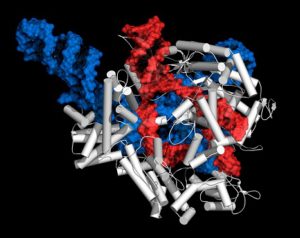Alloimmunization commonly affects 2-5% of all transfusion recipients and approximately 30% of chronically transfused patients with sickle-cell disease. Since ABO (Bombay phenotype), Rh, Kell, Duffy, and GPB blood group systems are prevalent antigens at the root of many alloimmunization reactions, researchers in the United Kingdom used CRISPR-Cas9 gene editing to create red blood cells void of these antigens. CRISPR (clustered regularly interspaced short palindromic repeats)-Cas9 is derived from bacteria, which uses the system as a primitive immune system to recognize and cleave short fragments of invading viral DNA. Researchers took advantage of CRISPR’s ability to recognize and cut any strand of DNA and knocked-out the genes for ABO, Rh, Kell, Duffy and antigens on glycophorin B in the human erythroblast cell line BEL-A. These cells differentiated into normally shaped reticulocytes void of these five antigens and could potentially be used as universal donor RBCs. This proof of principle study is encouraging that other antigens could be targeted to help meet the transfusion needs of patients who need complicated antigen matches.
Reference:


Wao! This is a good innovation/ discovery. This will give hope to those who require recurrent transfusion and their religious belief does not support it.